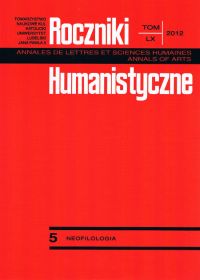Elements of Non-Formal Education as a Supplement the Formal Academic Curriculum for Translators
Abstract
Translation education is becoming more and more aware of the strategic status of the relationship that obtains between the student and the teacher in the translation classroom. Another more readily recognized fact is that the role of the student and the teacher must be redefined, according to the assumptions of so-called holistic, constructivist paradigms in the theory of learning. Drawing upon these two observations, the author suggests that the formal educational curriculum for translators be expanded by a set of non-formal initiatives and events. Non-formal education can help improve the curriculum in the following ways: by making it more flexible in terms of content, by opening it to the market and socio-cultural demands, by helping transform academic didacticism into real-life parameters of personal development.
References
Baumgarten S., Klimkowski K., Sullivan C., 2008, Towards a Transgressionist Approach: Critical-Reflexive Translator Education, [w:] Austemuehl F., Kornelius J., Learning Theories in Translation Studies, Trier: WVT Wissenschaflicher Verlag Trier, 33-62.
Grow R.O., 1991, Teaching Learners to Be Self-directed, „Adult Education Quarterly” nr 41, 125-149.
Grucza F., 1997, Języki ludzkie a wyrażenia językowe, wiedza a informacja, mózg a umysł ludzki, [w:] Grucza F., Dakowska M. (red.), Podejścia kognitywne w lingwistyce, translatoryce i glottodydaktyce. Materiały z XX Sympozjum ILS UW i PTLS, Warszawa: Wyd. UW, 7-21.
Grucza F., 2008, Lingwistyka stosowana: Historia – zadania – osiągnięcia, Warszawa: Wyd. KJS-KJAJ UW.
Hurtado Albir A., 2007, Competence-based Curriculum Design for Training Translators, „The Interpreter and Translator Trainer” nr 1, z. 2, 163-195.
Kiraly D., 2000, A Social Constructivist Approach to Translator Education: Empowerment from Theory to Practice, Manchester: St. Jerome.
Klimkowski K., 2007a, Team work as a method in translation. „Across Languages and Cultures” nr 7, z. 1, 93-103.
Klimkowski K., 2007b, Teamwork in translation: a challenge for translator education?, [w:] Garant M. (red.), Current Trends in Translation Teaching and Learning II, Helsinki: University of Helsinki Department of Translation Studies, 153-172.
Knowles M.S., Holton III E.F., Swanson R.A., 2009, Edukacja dorosłych, Warszawa: PWN.
Miller J.P., Seller W., 1985, Transmission Position: Educational Practice, [w:] Miller, J.P. i Seller W. (red.), Curriculum Perspective and Practice, New York: Longman, 37-61.
Nord Ch., 1997, Translating as a Purposeful Activity, Manchester: St. Jerome.
PACTE group, 2008, First Results of a Translation Competence Experiment: ‘Knowledge of Translation’ and ‘Efficacy of the Translation Process’, [w:] Kearns J. (red.), Translator and Interpreter Training. Continuum Studies in Translation, London/New York: Continuum, 104-126.
Płusa P., 2007, Rozwijanie kompetencji przekładu i kształcenie tłumaczy, Katowice: Wydawnictwo Uniwersytetu Śląskiego.
Copyright (c) 2012 Roczniki Humanistyczne

This work is licensed under a Creative Commons Attribution-NonCommercial-NoDerivatives 4.0 International License.





